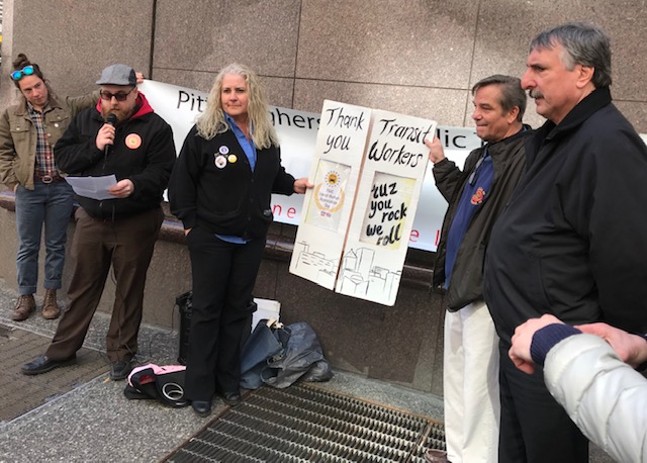On Transit Worker Appreciation Day, advocates call for steady funding amid impending crisis
On March 18, Transit Worker Appreciation Day, advocates at Pittsburghers for Public Transit (PPT) are not only reminding people to thank their bus drivers, but also asking riders to demand that Pennsylvania state legislators dedicate a steady funding stream to public transit.
A lawsuit against the Pennsylvania Turnpike Commission could mean big trouble to public transit agencies across the commonwealth, including the Port Authority of Allegheny County.
“Cuts in funding and service will lead to cuts in ridership,” said Jonah McAllister-Erickson of PPT during a rally outside of Wood Street T Station Downtown.
In 2013, the state passed Act 89, which raised the gas tax and siphoned funding from the turnpike to cover the costs of Pennsylvania’s public transit needs. The Turnpike Commission, which has been raising tolls for more than 10 years, has been recently claiming it can’t afford the $450 million annual payment to PennDOT, which then administers it to local transit agencies. (The commission is also currently undergoing a $6.9 billion widening project.)
And with a group of truckers suing the Turnpike Commission over its rate hikes, state officials and transit advocates are sounding the alarm that funding for agencies like the Port Authority could be in imminent danger.
McAllister-Erickson said Pennsylvania needs a better more stable funding source than it has currently. He also said state legislators should give more options for localities to raise their own transit funding. Allegheny County executive Rich Fitzgerald echoed this sentiment last week. For the most part, the only way Allegheny County can raise revenue is from increasing property taxes.
McAllister-Erickson said PPT supports a tax on large corporations to fund public transit, particularly the ones that benefit from the region's transit. He also hopes a new push for more stable funding will lead to funding that increases throughout the years. Last year, Port Authority ridership grew, largely led by increases in bus ridership.
But passing a new funding stream without making cuts through a Republican-controlled legislature may be difficult. McAllister-Erickson recognized this.
“What kind of fixes can you get through a legislature that is run by rural Republicans?” asked McAllister-Erickson.
More than 200 people signed cards thanking their public-transit operators and calling for dedicated transit funding.
Sue Scanlon, a Port Authority operator and PPT member, spoke at the rally. She said when public transit “continues to grow,” region runs better and more efficient.


